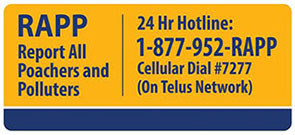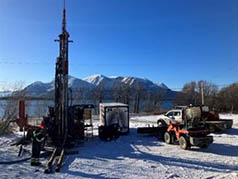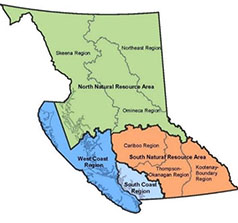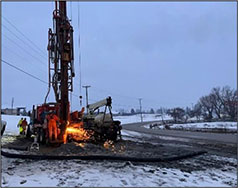Resources
B.C. Groundwater Updates
Edition: Update on Groundwater December 2023

THIS REPORT IS PREPARED FOR YOU by the water management teams within the Ministry of Water, Land, and Resource Stewardship (WLRS), and the Ministry of Environment and Climate Change Strategy (ENV)

IN THE DECEMBER 2023 ISSUE:
- GWELLS – 2023 Review of Well Record Submissions
- Drought Conditions
- Ministry of WLRS Updates
- Provincial Government Groundwater Program Regional Update
- Provincial Groundwater Observation Well Network Update (PGOWN)
- Registering as a GWELLS user to submit well records online
REPORT NON-COMPLIANCE
- Have you noticed a well that does not meet the construction standards of the Groundwater Protection Regulation?
- Know of someone who is drilling a well or installing a well pump without being registered


Drought Conditions
Drought is a recurring feature of climate change. Though B.C. is prone to experiencing drought conditions, 2023 brought extreme drought conditions for many basins in the province beginning mid-July. By mid-August, 85% of basins in the province reached drought level 4 or 5 – with level 5 being the highest, indicating adverse impacts to socio-economic or ecosystem values almost certain. Many streams fell to record low levels and groundwater levels in many provincial observation wells were at or near historic lows this year.
When voluntary conservation measures were not sufficient to protect critical environmental flows or the survival of a fish population, regulatory action was necessary under the Water Sustainability Act (WSA). In 2023, four Temporary Protection Orders were put in place to protect fish population survival. This regulatory action now also involves groundwater users, even if they do not have an authorization.
Farmers and ranchers faced some of the most significant challenges. The Province worked closely with the agricultural community and the federal government to support B.C. producers. New programs were created to help farmers find more hay and feed for their animals and adapt to climate change by providing incentives for the sector to invest in water infrastructure improvements.
- In B.C., drought response is a shared responsibility with the Province, the federal government, water providers, regional districts, municipalities and First Nations. The collective actions of all British Columbians made a positive difference.
The Province found ways to limit water use in government facilities and worked closely with large businesses and industries to reduce water use. The Province continues to work directly with communities to implement resources and respond to local conditions.
A reimbursement program for First Nations and local governments for the transportation of alternate drinking water was made available. Water restrictions remain in place in some areas. Please check with your local municipal authority or First Nation for current restrictions.
- The province continues to monitor drought conditions and urges people and businesses to continue their efforts to reduce water usage wherever possible.
For the latest information, please visit http://www.gov.bc.ca/drought.

Provincial Groundwater Program Regional Update – North Natural Resource Area
Existing Use Groundwater (EUGW) Licensing Update
In the north area, to date, about 50% of the existing groundwater licence applications have been processed. Depending on the region, the number of existing files completed each quarter ranges from a few to mid-30s. In addition to the complexity of the file, the information readiness of the application significantly impacts the processing time. For incomplete applications, the dedicated staff will proactively reach out to applicants in advance of processing their applications to reduce time spent waiting for a response. In the Omineca region, there have been no delays in processing EUGW applications!
Provincial Groundwater Observation Well Network (PGOWN)

Well Drilling in Altin (October 2023).
Photo credit: Jun Yin
This year is a productive year for the north area observation well network expansion. In March, we constructed two new observation wells in the Vanderhoof area for monitoring Aquifers #242 and #246. We also conducted pumping tests in both wells to obtain the hydraulic properties for input into a regional numerical model that the University of Northern British Columbia (UNBC) is developing. In Fort Nelson, we continue to work with the Fort Nelson First Nation to monitor the recently established observation wells. In the northwest corner of B.C., we worked with the Yukon government to construct a new observation well in Atlin. In a collaborative project, data collection will be performed by the groundwater staff from the Yukon government and submitted into the provincial Aquarius Time-Series database. We are also in the process of incorporating two existing monitoring wells into the PGOWN network, one in Terrace and one north of Fort St John near Rolla.
Groundwater Science Studies
The Stoney Creek numerical model is currently under development. The research team from UNBC has built the conceptual model and finished the first round of model calibration. Once the model is fully calibrated, we will use the model as a tool to test different scenarios including cumulative pumping and climate change.
We are also pleased to announce $150,000 in funding from the Ministry of Forests Indigenous Funding Program to initiate a groundwater protection project with the Lhedili T'enneh First Nation in the Shelley area near Prince George. The purpose of the project is to understand the local aquifers, the manganese issues in drinking water, and to develop a groundwater monitoring plan.
Aquifer Mapping
Last year, we completed the Kiskatinaw-Peace aquifer re-mapping project. The result has been published in the Water Science Series. After the Vanderhoof, Peace-Beaton, and Kiskatinaw-Peace remapping, we moved our gear further north to re-map the Fort Nelson area based on the additional information we collected in the past few years. Our contractor is working toward finalizing and reporting the results.
A lot of activity is happening in the north area. Reach out to us if you have any questions or ideas to better support the groundwater management that spatially covers half of the province!

CONTACT US
For general inquiries or the contact information for groundwater staff with statutory designation across the province, contact Groundwater@gov.bc.ca


Ministry of WLRS Updates
Sea Water Intrusion Advisory
The Southern Gulf Islands Sea Water Intrusion Advisory is now available. A sea water intrusion advisories webpage has recently been created; we intend to add other affected coastal aquifers in the future. This webpage can also accessed through our well drilling advisories webpage.
Additionally, the sea water intrusion advisories for the Southern Gulf Islands are now all linked into GWELLS. They are searchable through the advanced search function radio bar “Drilling and operation advisory” which includes a listing of all aquifers (including Flowing Artesian Well advisories) and are spatially visible/clickable. The aquifer summary page for a specific aquifer will indicate whether there is a Drilling & operation advisory beneath the “Knowledge Indicators” column.
Dewatering and Drainage Wells Water Policy Bulletin
The Dewatering and Drainage Wells Water Policy Bulletin is now available on the BC Gov water pages. This bulletin provides general information on the Water Sustainability Act (WSA) requirements for constructing, operating and decommissioning dewatering and drainage wells in British Columbia (B.C.). It explains the legislative similarities and differences between the two types of wells and includes additional resources for reference. This bulletin does not discuss the regulatory requirements for drainage works.
The BC Groundwater Science Compendium and Symposium
The compendium is a compilation of short summaries of groundwater science and monitoring projects supported by the province during the 2022-23 fiscal year. The compendium is available here.The 2nd annual Provincial Groundwater Symposium was held virtually on November 2nd. The symposium featured a series of short, high-level technical presentations highlighting the various groundwater research and monitoring projects sponsored by the provincial government over the past year. The event was well attended with more than 280 attendees from across Canada calling in to participate.


Provincial Groundwater Observation Well Network (PGOWN) Update
Did you know that the Provincial Groundwater Observation Well Network (PGOWN) has grown by over 45% since 2015? The network now has over 240 wells, monitoring over 180 aquifers across the province. In addition, 60% of our stations now have telemetry systems installed (i.e., ‘live’ data). The primary driver of this expansion and improvement in data access and quality is to provide data to resource managers, as well as local communities, First Nations, academics and environmental consultants.
While the network will continue to expand, it will likely be at a slower rate due to the amount of work required to maintain our large number of existing stations while ensuring the quality and reliability of the generated data.
However, there are plans to further upgrade stations with telemetry in the months and years ahead for high priority areas (e.g., aquifers that are likely hydraulically connected to surface water and are useful indicators for monitoring drought conditions).
Drilling Observation Well 510 in Deep Creek (March 2023).
Photo credit: Ministry of WLRS

Do you have questions about the PGOWN?
Contact groundwater@gov.bc.ca
Learn more about the Provincial Groundwater Observation Well Network by using the interactive map.

Registering as a GWELLS user to submit well records online
Get access in three easy steps:
1. Visit the GWELLS BCeID registration page to obtain either a Basic BCeID account or Business BCeID account. (Note, if you already have a Basic or Business BCeID account, you do not need to create a new one to access GWELLS)
2. After obtaining your BCeID, go to GWELLS and select the login button (top right of the application screen).
3. Once you have logged in, email gwells@gov.bc.ca to request access for your BCeID user account.
Once access has been granted, you will be able to enter and submit groundwater well reports through GWELLS.






